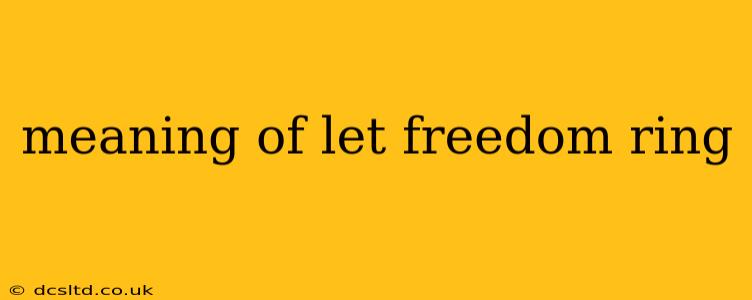The phrase "Let freedom ring" is a powerful and evocative call for liberty and equality, deeply rooted in American history and resonant across the globe. While its most famous iteration comes from Martin Luther King Jr.'s iconic "I Have a Dream" speech, the sentiment itself carries a much broader and longer history. Understanding its meaning requires examining its context, its evolution, and its enduring significance.
What Does "Let Freedom Ring" Actually Mean?
At its core, "Let freedom ring" signifies a desire for universal freedom and liberation from oppression. It's not merely about the absence of physical chains, but the dismantling of all systems and structures that impede individual liberty and self-determination. This includes:
- Political Freedom: The right to vote, to participate in government, and to be free from tyrannical rule.
- Economic Freedom: The opportunity to pursue one's livelihood without undue constraints, exploitation, or poverty.
- Social Freedom: The ability to express oneself freely, to associate with whomever one chooses, and to be free from discrimination based on race, religion, gender, sexual orientation, or any other arbitrary characteristic.
- Spiritual Freedom: The liberty to practice one's faith (or lack thereof) without coercion or persecution.
The phrase implies a ringing sound – a powerful, resonant bell that echoes the proclamation of freedom to all corners of the earth. It symbolizes a widespread and undeniable declaration of liberation.
Where Did the Phrase Originate?
While Martin Luther King Jr. immortalized the phrase, its roots extend far back. The concept of freedom's resonant call appears in earlier literature and speeches, underscoring its enduring appeal as a potent symbol of hope and aspiration. King's masterful use, however, elevated it to a powerful rallying cry for the Civil Rights Movement.
Martin Luther King Jr.'s Use of "Let Freedom Ring"
In his 1963 "I Have a Dream" speech, delivered from the steps of the Lincoln Memorial, King's repetition of "Let freedom ring" is breathtaking. He paints a vivid picture of freedom echoing across the nation, from state to state, culminating in a universal declaration of equality. His use of the phrase was profoundly impactful, transforming it into a symbol of the struggle for racial justice and equality.
How did King use the phrase to convey his message?
King strategically used the repetition of "Let freedom ring" to amplify his vision of a unified and equitable nation. By referencing specific states and their historical struggles, he underscored the universality of the fight for freedom and the interconnectedness of various liberation movements.
What are other interpretations of "Let Freedom Ring"?
While primarily associated with racial justice, the phrase’s broad meaning allows for diverse interpretations. It can apply to any struggle for liberation, including:
- Women's suffrage: The fight for women's right to vote and equal participation in society.
- LGBTQ+ rights: The ongoing struggle for equality and acceptance for lesbian, gay, bisexual, transgender, and queer individuals.
- Environmental justice: The movement for environmental protection and equitable access to resources.
The Enduring Legacy of "Let Freedom Ring"
"Let freedom ring" continues to resonate today as a powerful symbol of hope and a call to action. It serves as a reminder that the fight for freedom and equality is an ongoing process, requiring constant vigilance and commitment. The phrase continues to inspire movements for social justice around the world, reminding us that the pursuit of liberty is a universal aspiration.
This phrase is not just a historical artifact; it is a living testament to the ongoing struggle for a more just and equitable world. It is a call to action, a beacon of hope, and a reminder that the fight for freedom is a continuous journey, not a destination.
